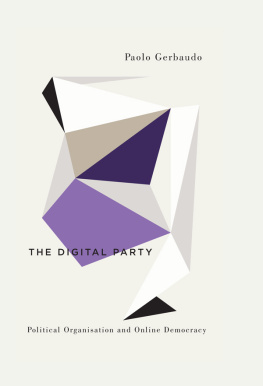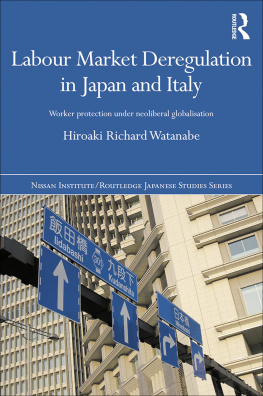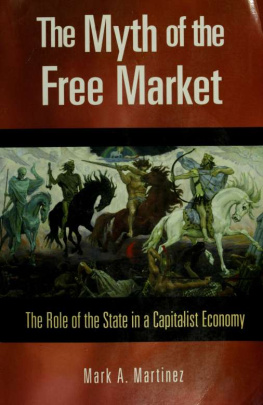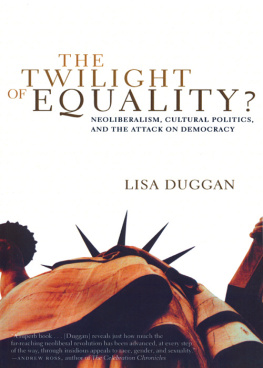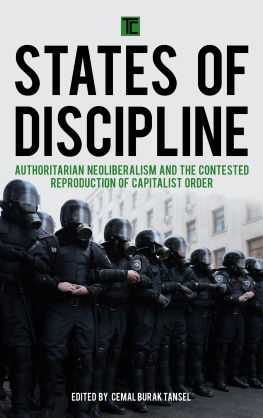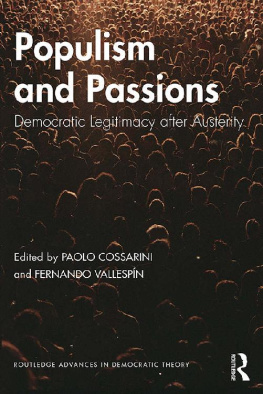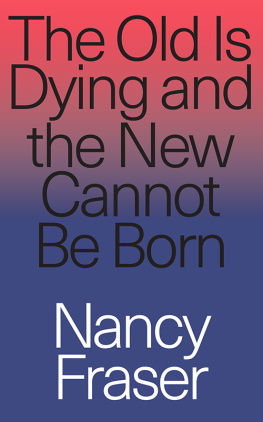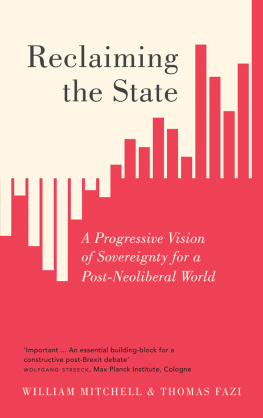Contents
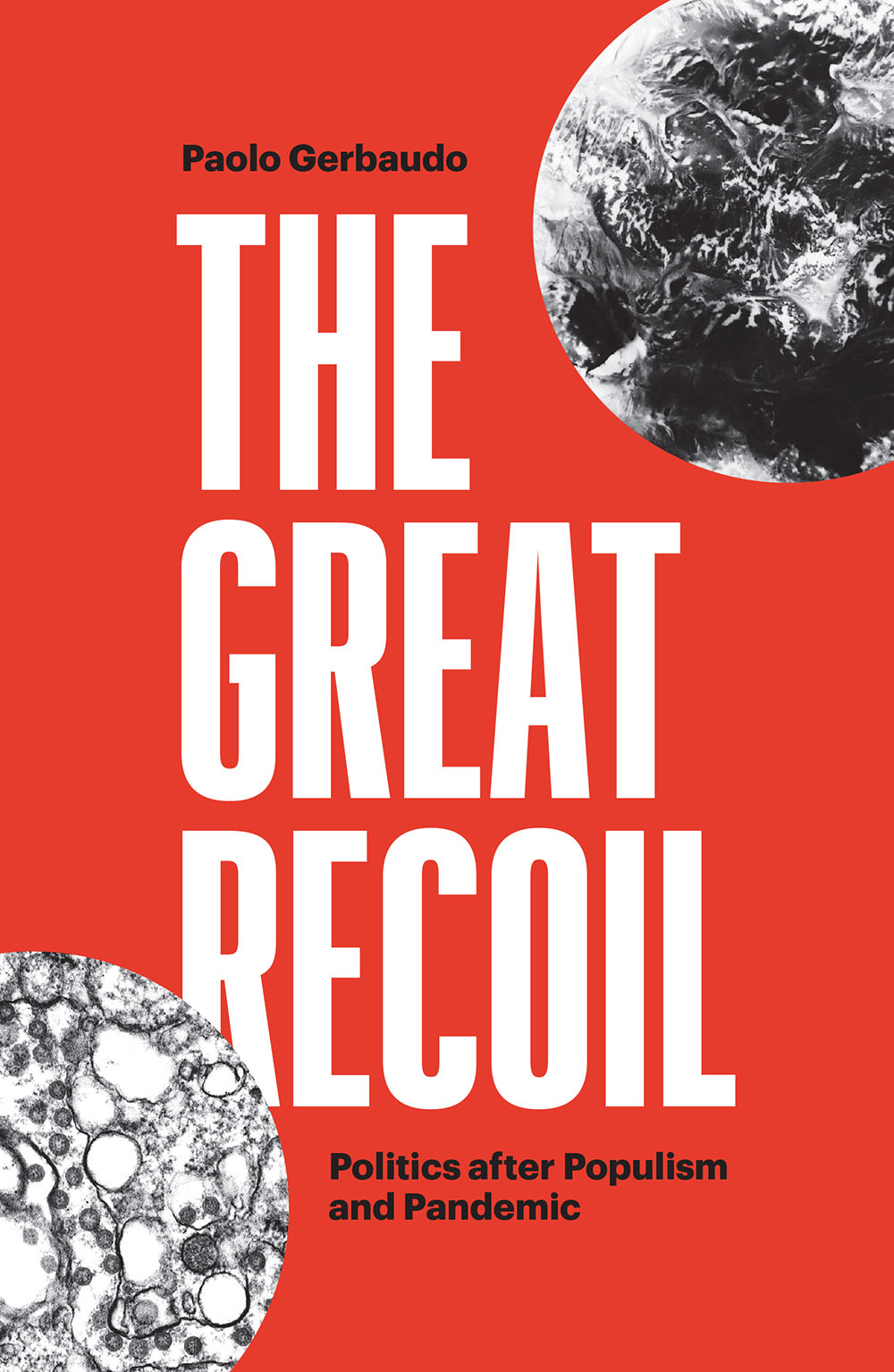
The Great Recoil
The Great Recoil
Politics after Populism and Pandemic
Paolo Gerbaudo

First published by Verso 2021
Paolo Gerbaudo 2021
All rights reserved
The moral rights of the author have been asserted
1 3 5 7 9 10 8 6 4 2
Verso
UK: 6 Meard Street, London W1F 0EG
US: 20 Jay Street, Suite 1010, Brooklyn, NY 11201
versobooks.com
Verso is the imprint of New Left Books
ISBN-13: 978-1-78873-050-1
ISBN-13: 978-1-78873-053-2 (US EBK)
ISBN-13: 978-1-78873-052-5 (UK EBK)
British Library Cataloguing in Publication Data
A catalogue record for this book is available from the British Library
Library of Congress Cataloging-in-Publication Data
Names: Gerbaudo, Paolo, author.
Title: The great recoil: politics after populism and pandemic / Paolo Gerbaudo.
Description: First edition hardback. | Brooklyn: Verso Books, 2021. | Includes bibliographical references and index. | Summary: In these times of pandemic, economic collapse, populist anger and ecological threat, societies are turning inward in search of protection. Neoliberalism, which has presided over decades of market globalisation, is on trial, while state intervention is making a spectacular comeback amid lockdowns, mass vaccination programmes, deficit spending and environmental planning. This is the Great Recoil, the era when the politics of national sovereignty, economic protection and democratic control overrides the neoliberal ideology of free markets, labour flexibility and business opportunityProvided by publisher.
Identifiers: LCCN 2021015707 (print) | LCCN 2021015708 (ebook) | ISBN 9781788730501 (hardback) | ISBN 9781788730532 (ebk)
Subjects: LCSH: NeoliberalismEconomic aspects. | Populism. | Globalization.
Classification: LCC HB95 .G448 2021 (print) | LCC HB95 (ebook) | DDC 330.15dc23
LC record available at https://lccn.loc.gov/2021015707
LC ebook record available at https://lccn.loc.gov/2021015708
Typeset in Minion by Hewer Text UK Ltd, Edinburgh
Printed and bound by CPI Group (UK) Ltd, Croydon CR0 4YY
Contents
I am grateful to all the colleagues, friends and comrades that made this book possible. First and foremost, I would like to thank my editors at Verso for guiding and supporting me throughout the four long years it took me to finalise the volume, to the readers who provided useful advice, and to my personal editor Alex Foti for his constant advice and inspiration. The invitations to give talks on contemporary ideology by Yannis Stavrakakis and the Populismus research group at the University of Thessaloniki; Ege Moritz and Johannes Springer at the Department for Cultural Anthropology and European Ethnology at the University of Gttingen; Jan-Werner Mller and the Project in the History of Political Thought at the Center for Human Values at Princeton University; Marcos Nobre and the Mecila Research Centre in So Paulo in Brazil; and Josep Ramoneda and the Escola Europea dHumanitats in Barcelona provided invaluable occasions to discuss some of the ideas that inform the book.
I am strongly indebted to the people who reviewed a first draft of the manuscript: Mirko Canevaro, Nadia Urbinati, Gaetano Inglese, Anton Jger, Jacopo Custodi, Carlo Mongini, George Venizelos, Caspar Below, Brenda Vzquez Uribe, Louis Bayman, Darren Loucaides, Cesar Jimenez Martinez, Sabrina Provenzani, Jeffrey Broxmeyer, Patricia Ferreira, Ed Hadfield, Mariana Galvo Lyra, Roy Cobby Avaria, Adam Bull, Matteo Santarelli, Francesco Marchesi, Angelo Boccato, Natalia Miranda and Giuseppe Nardiello. I would also like to thank my colleagues and comrades for the fruitful conversations that offered insights for this book, and in particular Breno Bringel, Geoffrey Pleyers, Mark Cot, James Butler, Aaron Bastani, Jeremy Gilbert, Jennifer Pybus, Benjamin Fogel, Jodi Dean, Emanuele Ferragina, Lucia Rubinelli, Richard Barbrook, Jan Blommaert, Fabio Malini, Joan Subirats, Guendalina Anzolin, Simone Gasperin, Stathis Kouvelakis, Samuele Mazzolini, Tommaso Nencioni, James Meadway, Antonio Calleja and Javier Toret.
Last but foremost, I am grateful to my partner, Lara Pelaez, and my family and friends, for their inspiration and their constant support.
A number of traumatic events, starting with the 2008 economic recession and culminating with the coronavirus crisis, all combined with the impending ecological disaster of climate change, have shaken all political certainties and plunged Western capitalism into political chaos, causing societies to be dominated by anxiety and fear. This is the Great Recoil a period when the coordinates of history seem to have been reversed. Things that have been taken for granted for a generation globalisation; freedom of movement; economic growth; the clear demarcation of geopolitical friends, rivals and enemies all seem to have been thrown into question, creating much disorientation and consternation in polities around the world. The Great Recoil is the moment when societies turn backward and inward: when globalisation goes into retreat, the economy contracts and is barely propped up by massive injections of money by central banks; when people have to withdraw to their homes due to lockdowns, quarantines and confinement measures, and must shrink from contact with others. It is the time when society returns to itself, when the shock vis--vis the negativity of the world leads to a desperate yearning for interiority and autonomy, and we have to collectively address foundational questions concerning societys basic conditions of existence and self-reproduction.
The Great Recoil is a Hegelian metaphor that captures the process of profound ideological transformation at a moment of organic crisis in democratic capitalist societies. Neoliberalism, the economic and political philosophy that shelved the post-war social-democratic consensus and remade the world in the name of freedom by boosting private initiative and social inequality over the last forty years, seems incapable of providing responses to emerging historical dilemmas. The old dogmas of free market economics that have held sway since the 1980s on both the left and the right now look like the rusty remains of a gullible era; meanwhile the pandemic has demonstrated the folly of cuts to the public budget in the name of fiscal austerity, which have left health and education systems in tatters.
As the neoliberal worldview started to falter with the post-2008 Great Recession, new movements emerged on the right and the left, often jointly described as manifestations of a populist moment. From the 2011 protest movements to the Brexit referendum, from Trumps election to the rise of a new socialist left and leaders such as Corbyn, Iglesias and Sanders, recent years have witnessed extreme polarisation. Forces at opposite ends of the political spectrum have appealed to the people and against the elites and waged war against the central tenets of neoliberal dogma, with the left attacking its socio-economic premises, and the right demolishing its cultural tolerance. The populism of the 2010s was the dialectical negation of neoliberalism.
After the Covid-19 pandemic, it is time to look beyond the populist moment and assess the new landscape of post-neoliberal politics. Contemporary politics is not just a negative moment, a phase in which the old is dying and the new cannot be born, to cite a famous Gramsci quote obsessively repeated in recent years. nationalisation of strategic infrastructure and investment programmes to decarbonise the economy and address the climate crisis such as those put forward by President Biden, the interventionist state that traditional bugbear of neoliberalism is back. With the pandemic, neo-statism has become the political new normal, a meta-ideology that inflects virtually all political actors, but also a new battlefield where radically different visions of our political future are butting heads.


